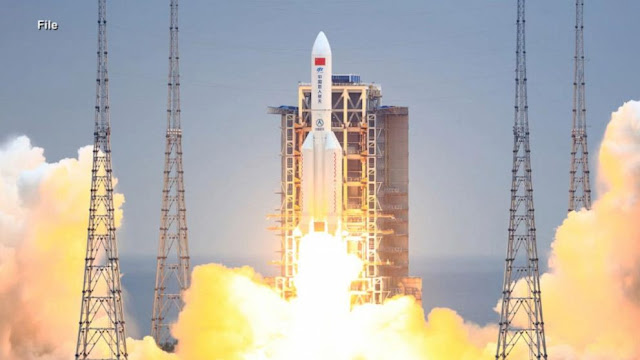LASTEST NEWS
China rocket wreck falls into Indian Ocean near Maldives
China rocket News
The wreckage of China’s Long March rocket crashed a key part of the space station under construction last month, falling into waters west of the Maldives’ Indian Ocean on Sunday.
The re-entry of the rocket, described by astronomers as the fourth largest unregulated retirement in history, has in recent days raised concerns that it may crash to the ground and has been criticized by the National Air Force and Space Administration (NASA). ) “Failed to meet responsible standards” in the US. China has dismissed concerns that much of the wreckage was burned during the re-entry, and that international waters are likely to fall further.
The China Mandated Space Agency (CSMA) said Sunday that “most of the equipment burned during the re-burn, and the remaining debris fell with the sea at 2.65 degrees north latitude and 72.47 degrees longitude at the center” west of the Maldives.
The Maldives National Defense Force said on Sunday that its Coast Guard Squadron was “active after receiving reports of rocket wreckage into Maldivian waters”.
NASA Administrator Bill Nelson said in a statement on the “Space Fairing Nations” that “to reduce the damage to the public and property of space objects on Earth and to increase transparency about those actions.” “It is becoming clear that China has failed to adhere to responsible standards regarding its space debris,” he said.
Chinese experts have dismissed criticism of the unrestricted entry, saying authorities have tracked the course, even though they have no control over where the wreckage fell.
“It only indicates the loss of propulsion, but it does not mean that China has lost its flight trajectory and real-time location,” said Songgongping, an aerospace commentator and former lecturer at PLA Rocket Force University. The wreckage from the American SpaceX Falcon 9 rocket that crashed on a farm in Washington state did not attract the same criticism and showed Western “double standards”, the Global Times reported.
Jonathan McDowell, an astrophysicist at the Harvard-Smithsonian Center for Astrophysics, said the uncontrolled recomontence of the Chinese rocket was “the fourth largest” of uncontrolled reunions, equivalent to the first long rocket that crashed in Ivory last year. Coast with reports of damaged house rubble in villages. “The sea recurrence is always statistically high,” he said on Twitter, indicating that China had played its gamble (until news of the wreckage in the Maldives reached us). But it is still careless. “
The Long March-5BY2 rocket carries the Tianhe or Heavenly Harmony module, the first of three major components for the construction of the China Space Center, which will be completed by the end of next year.
Chinese officials say Tiangong or Heavenly Palace will serve as the “space station management and control center”. The rocket was launched on April 29 from the Wenchang spacecraft launch site in Hainan Island Province.
The space station, the second largest after the International Space Station (ISS), has a lifespan of 10 years, but can last up to 15 years or 2037. The ISS, experts say, could extend life until 2030, when one of its members, Russia, said it would launch its own space center.




